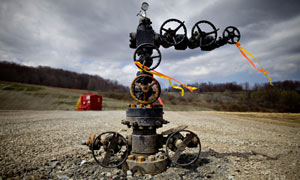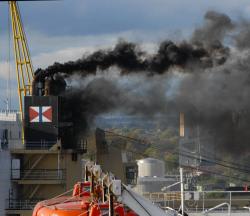 My heart sinks when I read enthusiastic acclamations of natural gas as a substitute for coal. It releases less CO2 on combustion, we’re told. It is a good bridge to the time when renewable energy is sufficiently developed to take over. And latterly, with the development of fracking, that’s going to be a very long bridge. There are claims that if we can extract all the shale natural gas there’s enough to keep us supplied for 200 years. And in addition there’s the wonderful supply awaiting extraction from methane hydrates in the ocean once we find out how to do it.
My heart sinks when I read enthusiastic acclamations of natural gas as a substitute for coal. It releases less CO2 on combustion, we’re told. It is a good bridge to the time when renewable energy is sufficiently developed to take over. And latterly, with the development of fracking, that’s going to be a very long bridge. There are claims that if we can extract all the shale natural gas there’s enough to keep us supplied for 200 years. And in addition there’s the wonderful supply awaiting extraction from methane hydrates in the ocean once we find out how to do it.
The oil and gas companies even hail it as a green fuel. It’s no such thing. Natural gas is a fossil fuel. It releases CO2 when it is burned. It may be preferable to coal, but it is no solution to the crisis we are confronted with. And there is in any case doubt being cast on its superiority to coal, especially when it is obtained by unconventional means. In a paper published in Climatic Change Letters earlier this year Howarth et al evaluate the greenhouse gas footprint of natural gas obtained by high volume hydraulic fracturing from shale formations, focusing on methane emissions. Continue reading “Natural Gas is Not a Green Fuel”

 International shipping is responsible for an estimated 3 percent of global greenhouse gas emissions, equivalent to those of Germany, thirteen times those of New Zealand. On current trends they are expected to increase by 150-250 percent by 2050. They are as yet unregulated, trapped for over a decade in a familiar impasse where developed countries argue that all ships must be covered by the same regulation, the norm in the International Marine Organisation, but most developing countries insist that any regulation respects the principle that developed countries must lead the fight against climate change, known in the UN Framework Convention on Climate Change as ‘common but differentiated responsibilities’.
International shipping is responsible for an estimated 3 percent of global greenhouse gas emissions, equivalent to those of Germany, thirteen times those of New Zealand. On current trends they are expected to increase by 150-250 percent by 2050. They are as yet unregulated, trapped for over a decade in a familiar impasse where developed countries argue that all ships must be covered by the same regulation, the norm in the International Marine Organisation, but most developing countries insist that any regulation respects the principle that developed countries must lead the fight against climate change, known in the UN Framework Convention on Climate Change as ‘common but differentiated responsibilities’. I was a little startled a few weeks back to see in a Waikato Times column written by former National Party MP Michael Cox the extraordinary claim that the 1991 Mt Pinatubo eruption “shot out more greenhouse gases into the atmosphere than the entire human race had emitted in its entire years on Earth”. I don’t know where he derived this from – no doubt it’s floating around somewhere in the denial world, though even there it seems possible that he misunderstood what he was reading. Anyway it served to support his view that talk of human-caused warming is a Left-inspired crusade to compensate for the collapse of communism! I was able to say in a letter to the paper how ridiculous the Pinatubo statement was, and pretty much everything else he said as well.
I was a little startled a few weeks back to see in a Waikato Times column written by former National Party MP Michael Cox the extraordinary claim that the 1991 Mt Pinatubo eruption “shot out more greenhouse gases into the atmosphere than the entire human race had emitted in its entire years on Earth”. I don’t know where he derived this from – no doubt it’s floating around somewhere in the denial world, though even there it seems possible that he misunderstood what he was reading. Anyway it served to support his view that talk of human-caused warming is a Left-inspired crusade to compensate for the collapse of communism! I was able to say in a letter to the paper how ridiculous the Pinatubo statement was, and pretty much everything else he said as well.  The Guardian, with the exception of the
The Guardian, with the exception of the